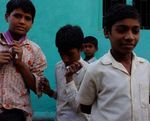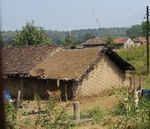India Internship Opportunities - Jamnya Sustainable Housing Project Build - Ceres
←
→
Page content transcription
If your browser does not render page correctly, please read the page content below
India
Jamnya Sustainable Housing Project Build
Internship Opportunities
November/December 2019
Climate Change │Minority groups │Forestry │Sustainable Building │Water Management │Empowerment │Earth buildingAbout this trip:
CERES Global have recently completed the first dwelling of the Jamnya
Sustainable Housing project, working with the local community to
provide quality sustainably built housing in order to attract a higher
caliber of female teacher to the remote tribal boarding school in
Jamnya, India.
With the completion of phase one, and as the friendship and cross-
cultural collaboration continues and deepens with the local
community, we are ready to kick off the next phase of the project.
Working with local partner organisation Satpuda Vikas Mandal, we will
continue to introduce appropriate sustainable building technologies
as agreed with local stakeholders and the Earth Institute in Tamil
Nadu. We will also be broadening our skill base and collaborating with
3 new local and international organisations. Mumbai based Put Your
Hands Together will join us, as will Australian based Agari Farm.
We are currently looking for volunteers and interns with a skill or
interest in alternative sustainable building design who are willing to
put themselves to work in the remote tribal village of Jamnya. An
opportunity to learn earth brick and bamboo building techniques whilst contributing to a project that uses
alterative environmentally sustainable technology whilst providing much needed teachers accommodation to this
remote area.
CERES Global Internship opportunities:
Stakeholders have identified environmental, social, health and political areas for our collective focus and research,
and are supporting us in conversation and through sharing their networks to achieve sustainable growth and
development in the remote Maharashtran mountains.
CERES Global are offering a number of internship places in 2019 for post & undergrad university students to get
directly involved in the housing project and other areas of interst. As a requirement of the internship, students
will undertake pre-departure, in country, and post-trip activities.
Pre-Departure – Work with CERES Global to identify a relevant research topic based on the upcoming trip and
in response to the needs of the partner organisation. This phase will require planning, meetings, and activity
conducted on site at CERES in East Brunswick, as well as home based research.
In Country – Getting hands on in India with the build of the project and collecting data for research.
Post trip – Reporting on the international engagement, findings, recommendations, and details on issues
explored and the various needs of communities to meet challenges.
In designing your specific internship, we encourage you to contact CERES Global and we can
meet to explore your study interests and skill set to ensure you’re gaining the most from the
experience, and that you’re adding real value to the program partners and beneficiaries.
1Themes:
Climate Change: Resilience, adaptation, forestry/deforestation, water table, conservation.
Community: Civil Society, women’s empowerment, spirituality, social enterprise, collaboration.
Sustainable Building: Earth building, bamboo construction, compression soil brick pressing.
Education: Skills training, environment & sustainability, social enterprise development.
Research opportunities:
Minority group self-determination: The region around Jamnya is host to a number of tribal minority groups with
various claims to land. Having been pushed into the furthest outreaches of the country, tribal groups often use
forestry resources for home construction and burning, which is at odds to the local laws and requirements of the
India forestry commission. Monitoring of forest degradation, understanding the dynamic between tribals and
government departments, and exploring issues around land sovereignty are all research areas that will add value
to the Jamnya project and be valued by the people in the region for generations to come.
Sustainable Water Management: As the sustainable housing project continues, the community are now focussing
on health and sanitation through adequate toilet and waste management, and through the implementation of
solar hot water. Understanding the impact of waste on local waterways and the underground water table are
both key research areas, especially given the practice of re-directing monsoonal rains back in to the underground
reserve. Traditional large concrete water tanks at altitude are preferred by locals, so behaviour change to a more
sustainable option is also a key cross-cultural research area.
Gender and women’s empowerment: Currently there are no female teachers at the Jamnya boarding school due
to inadequate housing. The Jamnya project seeks to attract a female teacher to correct that imbalance and
introduce role models. Understanding the importance of gender equality and women’s empowerment in the
village environment is a key to ensuring that remote India keeps up with the rapid social changes happening in
Urban India.
Sustainable Agriculture and Climate Change: Partnering with SVM and the KVK farm science centre offers us
incredible access to remote rural farmers through their local meetings. Understanding their response to climate
change challenges, adoption of technologies, and resilience in the face of overpopulation, food security, and
economic challenges is key to learning from the agricultural backbone of developing nations, and understanding
how we as a planet will meet the needs of a growing planet and looking Asian food crisis.
Integrated Pest Management: Having completed phase one of the Jamnya Housing Project, our greatest
challenge was the adoption of new technologies by locals, and an invasion of borer in our bamboo roofing
structure. We’re now working on the training of new technologies through the Earth Institute in Tamil Nadu, and
embarking on the next phase of bamboo treatment and supply. Research across all fields of sustainable building
technologies is encouraged and will make a valuable contribution to the project.
Share Economy, Social Enterprise, Social Impact: Exploring opportunities for share economy in a low income area
will have impact in the region. Currently the community have a share tractor program, and have just set up earth
brick production as a viable social enterprise. The use of weather data collected for the Jamnya project has been
valuable in insurance cases for damaged plantations in storms. Farmers’ homes are filled to the roof with cotton
while they wait for the right sale price, however technology and the lack of cooperatives prevent efficient sales.
Research in to community cohesiveness, shared resources, and demonstration of resilience are key research
areas.
2Places We Go and Partner Organisations:
Pal and Jamnya Villages, Maharashtra
Pal is a village of around 6,000 people nestled in the Satpuda Ranges which borders the states of Maharashtra
and Madhya Pradesh. There are 3 tribal groups which inhabit the hills surrounding Pal; the Banjaras, Tadavis, and
Powarah tribes. Each group has its own distinct dress, customs, marriage arrangements, ownership and gender
practices. Some are Hindu, some Muslim, possibly blended with their ancient traditional religious practices.
The Satpuda Ranges were once a dense forest with monkeys, deer, tigers and panthers. Today only scattered
trees remain in most parts, the trees having been cut down for firewood for cooking or heating. This is
exacerbated by the increasing population and the clearing of land to grow additional food. These days one
sometimes sees monkeys in the hills, and very rarely a panther or leopard. Animal life has largely disappeared.
Jamnya is about 2 hrs away from Pal, deeper into the hills and forests along a rough, winding, dirt track passing
through several river beds which become impassable in monsoon months (July –Sept). The people at Jamnya
belong to the Powarah tribal group. Jamnya people are very poor but are lucky enough to have access to some
irrigated land so they are able to grow enough food to eat. As their population continues to grow, they continue
cut down protected forest land to feed their growing numbers. The Forestry Officers have told us the best way to
stop deforestation is to educate children so that they can get jobs in nearby towns and cities and bring wealth
from outside back to Jamnya. This is partly why we developed our sustainable building project to provide good
housing for teachers, so that the kids can receive an improved standard of education. It’s also why doing what we
can to improve IT access and skills is very important, making young people more employable outside remote
villages. The Jamnya housing project also seeks to attract a female teacher to Jamnya with improved
accommodation for gender balance.
3Partner Organisations:
Satpuda Vikas Mandal (SVM) - Pal
Satpuda Vikas Mandal is a community organisation devoted to working with tribal groups in the remote Satpuda
ranges surrounding the village of Pal. Inspired by Mahatma Gandhi, who called on Indian officials working for the
British to leave their jobs and work for the poorest of the poor. An Indian Police Officer who lived in a village on
the plains below the Satpuda ranges took up Gandhi’s call, left his well paid job and began working with tribal
groups around Pal. He was actually murdered by moneylenders whose corrupt practices he opposed. His son,
who was at university at the time, took up his father’s work and set up the organisation Satpuda Vikas Mandal in
Pal. The focus of Satpuda Vikas Mandal is on agriculture and education – but they also work on broad community
development projects, women’s groups, health issues, and environmental projects.
Satpuda Vikas Mandal manages 6 schools in Pal and surrounding villages. All schools have hostels so that students
from remote villages don’t have to travel each day. Roads are generally very poor and washed out during
monsoon rains.
For more information on the Jamnya Sustainable Housing Project, visit www.thejamnyaproject.com
To watch a short video on Jamnya, visit https://www.youtube.com/watch?v=G7EjQet5NnA
Giant Grass
Munir & Mittul are a consultancy partnership specialising in bamboo construction and global sustainable
construction, particularly low-cost in developing regions.
Agari Farm
Dani Wolff-Chambers is the co-founder and
driving force behind Agari Farm, having
recently spoken and run workshops at
Findhorn in Scotland, the Hyderabad
International Permaculture Convergence in
India, and at the Sustainable Living Festival
in Melbourne. Dani and Agari Farm have
committed to drawing on their vast network
of enthusiastic international labourer /
students, to join us in November for the
next three years of the Jamnya Project.
Put Your Hands Together (PYHT)
–Mumbai
Put Your Hands Together (PYHT) Are
Mumbai based Shahveer and Areen, both
recognised for their commitment to
sustainable design and construction.
Operating on a similar model to Agari
Farm, PYHT run training workshops in
sustainable building – and get the job done
in the process. PYHT will recruit Mumbai
locals to join us in November on site in
Jamnya for the next phase of the project.
4Other ways CERES Engages with Pal and Jamnya
Major involvements which occur most years
Interactions with school classes: providing practice in spoken English, possibly basic computer practice
Environmental education
Teacher training
Climate action: exploring options for reforestation, introducing solar cooking or biogas
Village Development: investigating and documenting priority needs of villages, practical steps to meet
needs
Women’s Group: talking with groups about their plans, how to achieve them, providing support where
possible
The success of a given engagement often depends on the enquiry of our group, and the rapport we’re able to
build in usually a short period of time. It’s important to give some thought to what it is that each of us hope to
gain from the engagement, what we might be able to share, and how we all might benefit from the interaction.
It’s also important to be mindful of vastly different cultural norms, where there will often be layers of
interpretation and cross-cultural (mis)communication.
COST: $1,000 per week. This price includes all internal transport, meals, accommodation, the purchase of
carbon credits to offset airline travel, administration & project running costs. This price does not include flights
to and from India. Participants can expect to spend just a few more rupees on personal items.
For more information contact
CERES Community Environment Park
Corner of Stewart and Robert Sts
Brunswick East
p.03) 9389 0183
e.global@ceres.org.au
www.ceres.org.au/global
5You can also read


























































